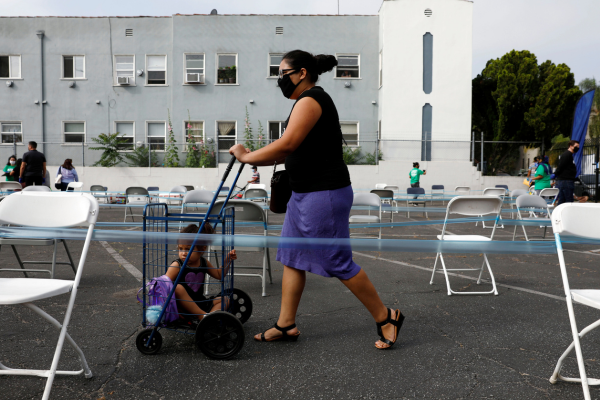It can be hard to remember, especially in a contentious election year, but bipartisan legislation to promote the common good is still possible. And equally hard to remember: People with different ideological goals — including both conservative and progressive Christians — can work together to make good legislation happen. Yes, really.
This week the House voted with a resounding margin of 357 to 70 to pass a bill that includes support for low-income families with multiple children. If passed in the Senate, the “Tax Relief for American Families and Workers Act” will enhance the Child Tax Credit by expanding eligibility and adjusting payments for inflation, provisions that would benefit about 16 million children in families with low income, lifting 400,000 children above the poverty line.
As a father to two preteen boys, I know only too well that becoming a parent transforms every aspect of daily life, from your sleep schedule to your financial priorities; according to one estimate, it costs nearly $240,000 to raise a child from birth to age 18 — a cost that does not include helping that child pay for higher education. Like many parents, I feel the sacred responsibility to ensure that my children have what they need not just to survive but thrive.
The Apostle Paul emphasizes this responsibility in his first pastoral letter to Timothy, writing that “anyone who does not provide for their relatives, and especially for their own household, has denied the faith and is worse than an unbeliever” (1 Timothy 5:8). And as we know from social science, the stakes of fulfilling this responsibility are most acute in the first three years of a child’s life when a lack of care, nutrition, or stimulation can stunt the full development of their brain and sabotage their future. The CTC provides a crucial lifeline of additional financial support for the many parents and families facing adversity while caring for their kids.
For several years, faith leaders and anti-poverty advocates across the partisan and ideological spectrum have voiced their support to renew the expanded CTC. Moderate and conservative Christian organizations — including the National Association of Evangelicals, Susan B. Anthony Pro-Life America, and the Ethics and Religious Liberty Commission of the Southern Baptist Convention — have argued that expanding the CTC is pro-family, pro-parent, and pro-life. Through my own work at Sojourners, I’ve joined other faith leaders in the Circle of Protection — a diverse coalition of denominations and Christian organizations that includes Catholics, evangelicals, and mainline Protestants — in calling on Congress to expand the CTC.
As you might expect in a bipartisan tax bill, there were compromises that irked those on either end of the political spectrum: While still a victory for low-income families, the plan doesn’t go nearly as far as the initial expansion of the CTC in 2021, which helped cut child poverty in half. Likewise, the plan revives three business tax breaks favored by many Republicans and some Democrats but opposed by some members of the ultra-right Freedom Caucus.
Though I’d like to see even greater support for low-income families in future legislation, I am eager to see this bill pass in the Senate. The bill will face serious objections, including Republican complaints that bill amounts to “cash welfare” or a government-imposed redistribution of wealth from people who pay income taxes to those who do not. Others opposed to the bill have argued that government spending is simply too high or that we just can’t afford programs like the CTC (even though the package would be paid for by ending an outdated business tax credit); that the credit could be exploited by undocumented immigrants (a claim rejected by the House committee responsible for taxation); or that the credit would cause some parents to leave work or stop looking for a job (an argument that even columnists at the conservative National Review refute). Sadly, some senators’ votes will come down to cynical, short-term political calculations. Senator Chuck E. Grassley (R-Iowa) argued that “passing a tax bill that makes the president look good — mailing out checks before the election — means that he could be reelected, and then we won’t extend the 2017 tax cuts.”
In order to overcome these objections and galvanize enough political will behind the bill, I urge Christians across the theological spectrum to join me in voicing your strong support for the bill from a moral perspective. As Christians, we believe parents are key in providing what their kids need to thrive, but we also know this sacred responsibility doesn’t solely fall on parents. In Matthew 25, Jesus says how we treat people in the most vulnerable situations in our society is how we treat Jesus himself, outlining that we have a collective responsibility to ensure that everyone—including children—can thrive. This shared responsibility means that families, communities, congregations, charitable organizations, and yes, the government have an indispensable role to play.
Some Christians balk at the idea of government having a role to play in the common good, but it’s an idea embedded throughout scripture: For example, in Romans 13 Paul writes that authorities are entrusted to restrain evil and promote the common good. It is hard to think of a policy that advances the common good more than helping to ensure that every child is fully cared for and can realize their full potential.
By expanding the Child Tax Credit, Congress has a critical opportunity to provide real help to millions of families and children. As Proverbs 3:27 tells us, “Do not withhold good from those to whom it is due, when it is in your power to act.” In a time when so many are still struggling, we must work together to ensure that the Senate does not withhold the incredible good of an enhanced CTC from families and children in need.
Got something to say about what you're reading? We value your feedback!







